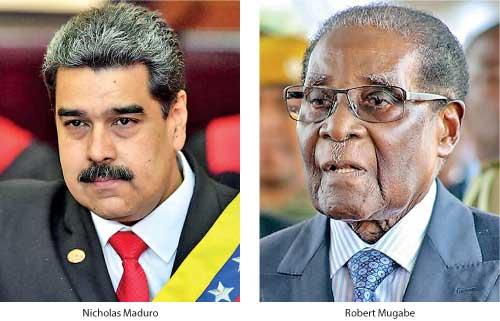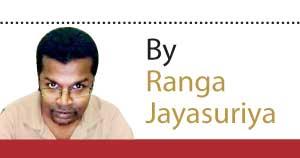Reply To:
Name - Reply Comment
There’s a great deal of ruin in a nation, Adam Smith once consoled a friend who remarked, after the British defeat in Saratoga, ‘if we go on at this rate, the nation must be ruined.’
in Saratoga, ‘if we go on at this rate, the nation must be ruined.’
By that Smith meant, it takes an awful lot of blunder by the political leaders to destroy a nation, which during centuries of its existence, has accumulated wealth, institutions and goodwill, and is therefore enormously resilient.
In general, for countries, rich or poor, it takes a great deal of ‘ruin’ before those nations are actually ruined. It would take more than a major war or disaster to destroy a country.
Try telling that to a Venezuelan! Venezuela, one of the richest in South America a decade ago and has the world’s largest oil reservesis now a byword of hyperinflation, starvation and total economic collapse. Five million people have fled the country. Or tell that a Zimbabwean, whose country’s fall from Africa’s breadbasket to a basket case in the early 2000s was equally rapid.
 Most economies have fundamental weaknesses, others go through ups and downs, many others emerged from low-income status, and then get stuck in the Middle-Income Trap, like Argentina that has been languishing there for over half a century. Still, their inherent strength shields them from a complete collapse.
Most economies have fundamental weaknesses, others go through ups and downs, many others emerged from low-income status, and then get stuck in the Middle-Income Trap, like Argentina that has been languishing there for over half a century. Still, their inherent strength shields them from a complete collapse.
For a few states that saw a complete reversal of fortune, there has always been another factor: Each had political leadership that was callously indifferent to the existential realities, who presided over the ruin of their nations. They could pull that off for they have already dismantled or taken captive the institutions and squandered the internal strength of their nations.
"In general, for countries, rich or poor, it takes a great deal of ‘ruin’ before those nations are actually ruined. It would take more than a major war or disaster to destroy a country"
Sri Lanka might be at the risk of replicating a similar disaster. Its political leaders mimic Nicholas Maduro light. The extent of the country’s economic troubles can be extrapolated much less in the Central Bank report, but the parallel foreign exchange markets. The dollar is now traded for Rs.225-226 in unofficial kerb markets, way above the official exchange rate of around Rs 200.
After sovereign bonds are repeatedly undersubscribed – the last one for a modest USD 100 million was only 1/3rd sold, the government is going through a money-printing binge. On June 28, the Central Bank printed a whopping Rs.208 billion, a single-day record.
Government debt as a share of gross domestic product is expected to rise to 115% at the end of 2021, according to the World Bank. That is a 28% increase from 86.8% at the end of 2019 when Gotabaya Rajapaksa was elected president, followed by an SLPP government.
Sovereign default is looming large. Even while the government is assuring that it would service debt, Sri Lankan bonds are traded at hefty discounts in the secondary market.
Sri Lanka has a total of about US$29 billion in foreign-currency debt obligations between now and 2026, against foreign-exchange reserves of US$4.5 billion as of end-April 2021, according to Fitch, the credit rating provider. Though bilateral loans and an upcoming IMF Special Drawing Rights facility may enable the country to pay its foreign debt for this year, how the government plans to meet the country’s foreign-currency debt-servicing needs for 2022 and the medium term is not clear.
Banks are running out of dollars and importers are going on’ dollar shopping’. Social media is ripe with speculations about a looming import ban on mobile phones and household electronic items. (The government has claimed no such decision has been taken). Last week, the finance ministry announced further restrictions on outward foreign exchange transfers.
In the meanwhile, amidst the coronavirus pandemic and the country’s foreign exchange woes, Gotabaya Rajapaksa, the President is unleashing devastation upon the country’s farmers. An import ban on chemical fertilizer guided by a presidential decision to shift to zero chemical fertilizer and weedicide farming in all of the country’s farmlands has already taken the brunt on the agricultural sector. Nation’s farmers, who account for one in four of the work force are protesting, while the presidential advisors keep defending the policy.
"Government debt as a share of gross domestic product is expected to rise to 115% at the end of 2021, according to the World Bank. That is a 28% increase from 86.8% at the end of 2019 when Gotabaya Rajapaksa was elected President, followed by an SLPP government"
The Covid-19 pandemic worsened the country’s financial woes, however, short-sighted tax concessions that were granted immediately after Gotabaya Rajapaksa presidency exacerbated the government’s fiscal situation, effectively reducing government revenue by 1.5% of the GDP.
How the government manages the current economic crisis without leading to a complete economic collapse is not clear. Parochial policies have only exacerbated the crisis. It has ruled out going for an IMF program.
Myth of Chinese lifeline
There happened to be another myth that the Chinese would rescue their China-friendly rulers in Colombo. However, experience in Venezuela, which has borrowed from Beijing to the tune of US$ 60 billion during 2007-2017 suggest that there is a limit for Chinese appetite. China’s economic diplomacy can be best explained as modern-day mercantilism. With geopolitical calculations gradually being added into the Chinese strategy, a Chinese lifeline, strong enough to significantly alleviate Sri Lanka’s fiscal woes would come with strings that the government’s nationalist fellow travellers would loath- though, for many of them, pseudo nationalism is only a political strategy.
The danger of an economic collapse will have predictable consequences on the fundamental freedoms of the citizenry. Maduro or Mugabe did not hesitate to unleash the coercive power of the state to silence and hunt their dissidents.
If it comes to the crunch, while the average folks are struggling to feed their families, critics of the government may have to look over the shoulder for white vans.
Follow @RangaJayasuriya
on Twitter